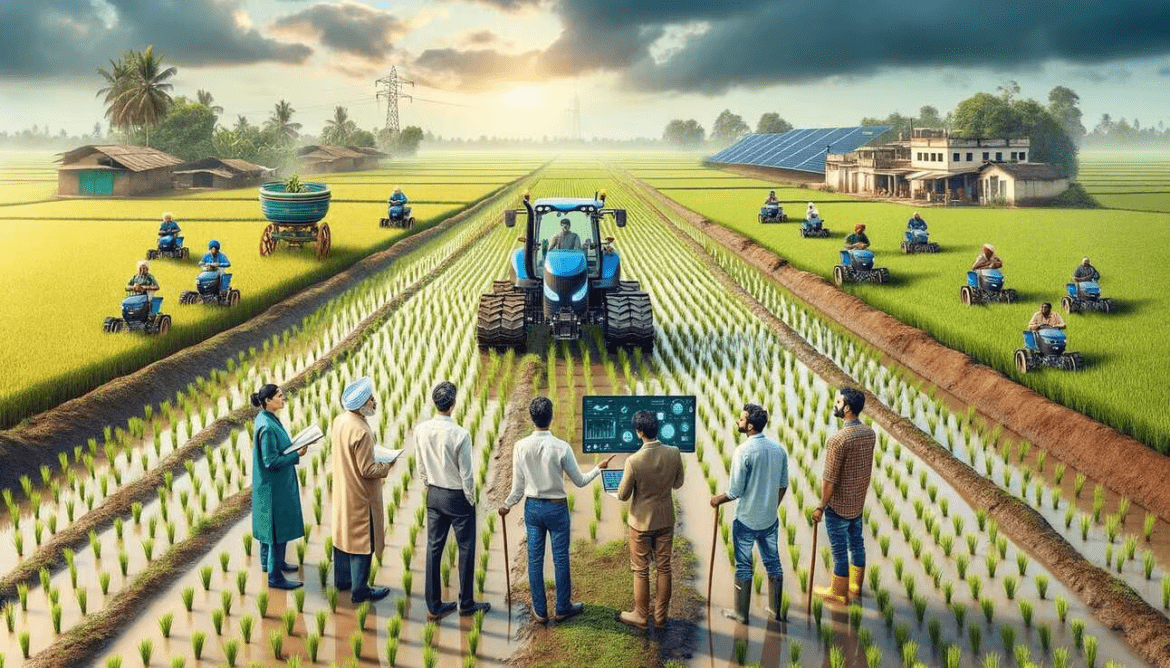AI Generated Summary
- As the world grapples with the dual challenges of ensuring ample food supply and maintaining environmental sustainability, India stands at the forefront with innovative practices and government initiatives aimed at creating a resilient and nutritious food system.
- In the heart of India’s rural landscape, a silent revolution is underway, reshaping the nation’s approach to agriculture, food security, and public health.
- Fortification efforts by the Food Safety and Standards Authority of India (FSSAI) ensure that fortified foods, including rice, wheat, and salt, reach the masses, combating deficiencies in proteins, vitamins, and minerals.
In the heart of India’s rural landscape, a silent revolution is underway, reshaping the nation’s approach to agriculture, food security, and public health. As the world grapples with the dual challenges of ensuring ample food supply and maintaining environmental sustainability, India stands at the forefront with innovative practices and government initiatives aimed at creating a resilient and nutritious food system.
Beyond Availability: Comprehensive Food Security
Food security in India transcends mere availability; it encompasses accessibility, utilization, and stability of safe, nutritious food essential for a healthy life. Agriculture is the linchpin in this framework, ensuring not only abundant yields but also food that is safe from contaminants and nutritionally rich. Sustainable farming practices are pivotal, promoting soil health, reducing harmful pesticide use, and minimizing environmental impact. This holistic approach not only enhances public health by reducing malnutrition and foodborne illnesses but also safeguards the planet’s ecological balance.
Sustainable Practices and Organic Farming Surge
The overuse of chemical fertilizers and pesticides, a legacy of the Green Revolution, has long compromised soil fertility and posed severe health risks. Today, India is pivoting towards organic and natural farming methods. Initiatives like the Paramparagat Krishi Vikas Yojana (PKVY) and the Mission Organic Value Chain Development (MOVCD) Programme have successfully converted over 4 lakh hectares to natural farming, promoting bio-fertilizers and biopesticides. States such as Gujarat, Himachal Pradesh, and Sikkim are leading the charge, with Sikkim being the first in the world to adopt 100% organic agriculture.
The Central Insecticides Board and Registration Committee (CIBRC) and the Insecticides Act of 1968 regulate pesticide use, ensuring that safer alternatives like bio-pesticides are accessible to farmers. Programs under the Integrated Pest Management Scheme train farmers in sustainable practices, reducing reliance on harmful chemicals and fostering healthier ecosystems.
Boosting Nutrition Through Innovation
Malnutrition remains a pressing issue, particularly among women and children, despite India’s strides in food grain production. Addressing this, the Indian Council of Agricultural Research has released over 100 biofortified crop varieties, enriching staples like rice with essential nutrients. Fortification efforts by the Food Safety and Standards Authority of India (FSSAI) ensure that fortified foods, including rice, wheat, and salt, reach the masses, combating deficiencies in proteins, vitamins, and minerals.
Moreover, home gardens have become a cornerstone of nutritional security. Supported by the Poshan Abhiyaan and Deendayal Antyodaya National Rural Livelihood Mission, these gardens empower women to cultivate diverse, nutrient-rich vegetables, ensuring fresh produce is available at minimal cost and enhancing dietary diversity across communities.
Clean Fuel and Health: A Dual Benefit
Indoor air pollution from traditional cooking fuels remains a significant health hazard, particularly for women and children. The Pradhan Mantri Ujjwala Yojana (PMUY) has been transformative, distributing over 10 crore LPG connections to rural households. This shift to cleaner fuel not only reduces respiratory illnesses but also curtails deforestation and environmental degradation. Additionally, biogas initiatives in villages like Jakariyapura in Gujarat provide sustainable energy solutions, further improving rural health and livelihoods.
Technological Advancements and Climate Resilience
Climate change poses a formidable threat to India’s agricultural stability. Sustainable practices and technological innovations are essential to building resilience. The Clean Plant Program (CPP), with a budget allocation of ₹1765.67 crore, aims to enhance fruit quality and productivity through disease-free plant centers. Concurrently, solar-powered solutions in remote areas, such as vaccine storage in Rajasthan’s Vardada village, ensure that healthcare infrastructure remains robust despite irregular electricity supplies.
Promoting Biodiversity and Reducing Waste
Healthy agricultural systems support biodiversity and conserve natural resources. India’s emphasis on medicinal farming, promoted by the Ministry of AYUSH, not only diversifies farmers’ income but also supplies essential herbal products to local and global markets. Food preservation techniques, including dehydration and drying, minimize crop wastage and ensure a steady food supply, even during off-seasons. These methods enhance the nutritional value of preserved foods, making them more beneficial for consumers.
Diet Discipline and Public Awareness
Recognizing the importance of diet in public health, the Indian Council of Medical Research (ICMR) has released the Dietary Guidelines for Indians 2024. These guidelines advocate for balanced diets aligned with traditional food habits, emphasizing the reduction of salt, fats, and sugars while promoting physical activity. By fostering healthy eating habits, India aims to tackle non-communicable diseases and improve overall public health outcomes.
A Sustainable Future for All
India’s comprehensive approach to food security integrates sustainable agriculture, nutritional innovation, clean energy, and public health initiatives. By prioritizing environmentally friendly practices and ensuring the availability of nutritious food, India is not only securing its food future but also enhancing the well-being of its population. As these initiatives gain momentum, India exemplifies how a nation can achieve food security and public health through resilience, sustainability, and innovation.
India’s agricultural transformation is a testament to the nation’s commitment to food security and public health. By embracing sustainable practices and leveraging technological advancements, India is paving the way for a healthier, more secure future for all its citizens.




